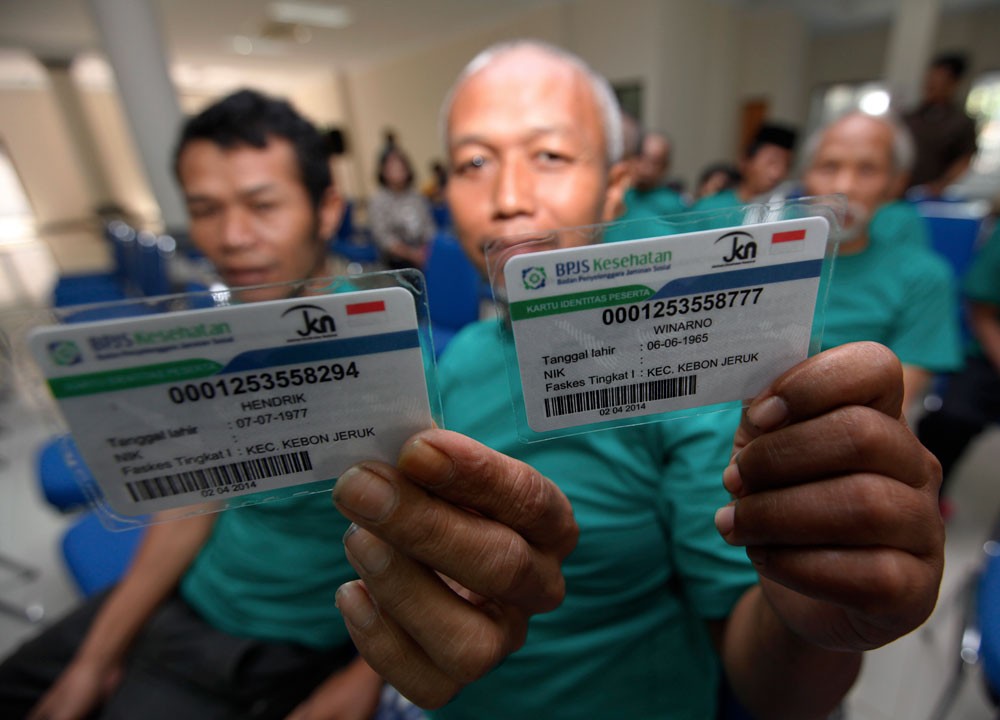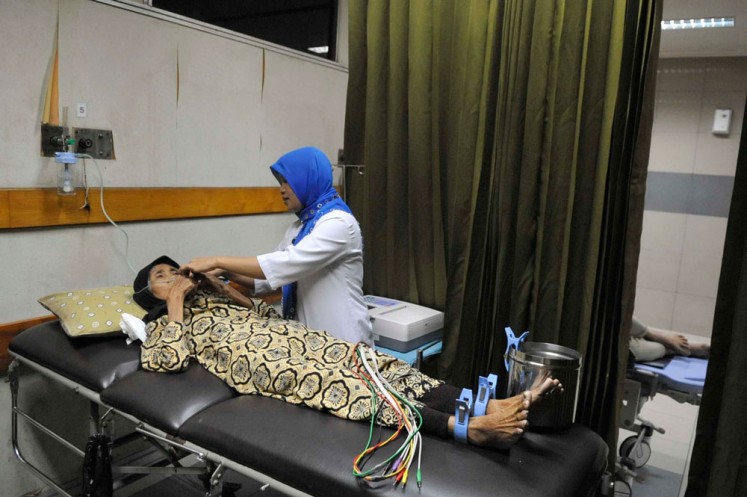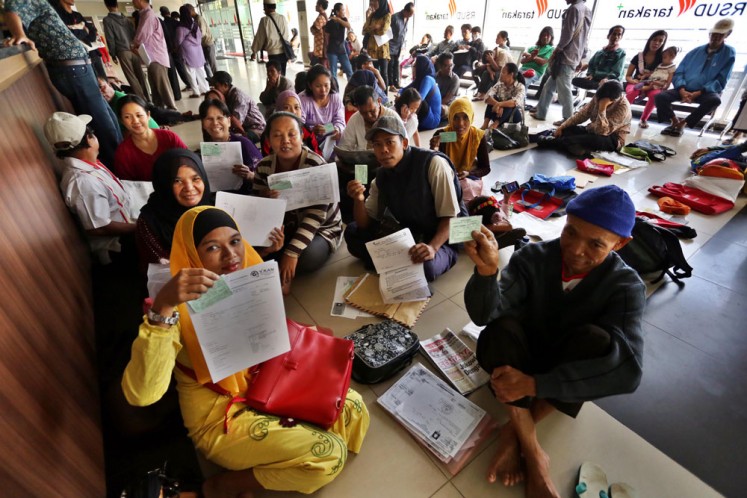Popular Reads
Top Results
Can't find what you're looking for?
View all search resultsPopular Reads
Top Results
Can't find what you're looking for?
View all search resultsBPJS Kesehatan, lifelong health care for the people
Change text size
Gift Premium Articles
to Anyone
L
ate 2015 was a difficult period for Kathy Oroh. Her 70-year-old mother had a stroke and was rushed to a private hospital. To pay for her mother’s treatment, Kathy had to spend Rp 80 million from her personal savings.
Realizing the cost of healthcare, Kathy was encouraged to register her mother for the Healthcare and Social Security Agency (BPJS Kesehatan) in early 2016. Since then, she has spent around Rp 200,000 per annum in addition to the monthly premium.
“BPJS Kesehatan helps a lot. The cost for treatment is very low and my mother has been getting good quality treatment,” said the Depok resident.
Kathy’s experience is one example of how BPJS Kesehatan helps the public. Officially introduced in 2014, the agency is tasked with providing national health insurance (JKN) in Indonesia.
Referring to Law No.40 Year 2004 on the National Social Security System, the JKN program is a fee-based compulsory social health insurance. Its objective is to achieve health insurance coverage for all Indonesians.
BPJS Kesehatan also shares the spirit of Nawa Cita (nine-point development program) championed by President Joko “Jokowi” Widodo and Vice President Jusuf Kalla, in revitalizing the role of the state in protecting all people and providing security to all citizens.
Four years on, BPJS Kesehatan has registered 186,602,571 people as of 1 December. By 2019, the government expects all Indonesians to be protected by BPJS Kesehatan and thus achieve a truly universal health coverage system.
BPJS Kesehatan’s revenue has also increased from Rp 40.7 trillion in 2014 to Rp 67.4 trillion in 2016.
Based on the figures released by the FEB Inquiry and the Society Institute at University of Indonesia in 2016, the BPJS Kesehatan social security program alleviated 1.16 million people from poverty.
Furthermore, JKN has protected 14.5 million people from acute poverty. The total utilization of JKN in three and a half years reached 522.9 million participants. This means 415,000 people use the service each day.
President director of BPJS Kesehatan Fachmi Idris said participant’s level of satisfaction in 2016 had reached 78.6 percent. The percentage exceeded the government’s expected figure of 75 percent.
"Of course, no public service can satisfy 100 percent of the people. Of the 186 million BPJS Kesehatan participants, some will feel less satisfied. Nevertheless, we are committed to improving ourselves," he asserted in a talk at the FMB9 gathering, themed Kupas Tuntas Layanan JKN (Getting to the Core of the JKN Service) held in Jakarta on Dec. 7.
Reflecting on the level of satisfaction, Fahmi added, there is no reason for concern regarding BPJS Kesehatan being hampered by its financial deficit.
"We can attest that this [deficit] is being handled well," Fachmi stated.
He said BPJS Kesehatan would never stop trying to provide the best services.
"Hospitals are required to offer good services. We have a standard to pay on time. Moreover, if we make a late payment, we also have to pay to the fine,” he explained.
Commitment from the government
Deputy Finance Minister Mardiasmo said the government had injected funds amounting to Rp 5.1 trillion to deal with the deficit. The funds came from cigarette sales tax revenue.
According to Mardiasmo, the government is also revising Presidential Regulation No.12 to improve the management of claims to BPJS Kesehatan, fraud prevention, the referral system, the reverse referral system and a moral hazard disease cost sharing system.
"We are also revising Government Regulation No.87/2013 to ensure BPJS Kesehatan’s cashflow is guaranteed," he added.
Mardiasmo assured that the government is giving special attention to the health budget. For instance, in 2017 state budget, the government allocated Rp 106.7 trillion to the health budget, equivalent to five percent of the total state budget.
In the regional provinces, as much as 10 percent of the total regional budget is allocated to health, or Rp 105.3 trillion out of Rp 1.0526 quadrillion.
"The state is there to improve the health of the nation," said Mardiasmo.
The expert staff for the Health Economics Department at the Health Ministry, Donald Pardede, said the Health Ministry continued to support the BPJS Kesehatan health insurance program.
"The social security program adheres to the principle of gotong royong (mutual cooperation)," he said.
The ministry is also working to promote healthy lifestyles to reduce the burden on health care.
"We want to reduce the number of people who suffer from the top eight catastrophic diseases," Donald added, referring to heart disease, kidney failure, cancer, stroke, hepatitis cirrhosis, thalassemia, leukemia and hemophilia.
The cost to for these eight diseases in the 2014-2016 period reached Rp 36.3 trillion, or 28 percent of the total cost for referral health care.
With continuous improvement, BPJS Kesehatan services will provide quality services as the agency has one clear objective of realizing a healthy society, the recipe for a stronger nation.












